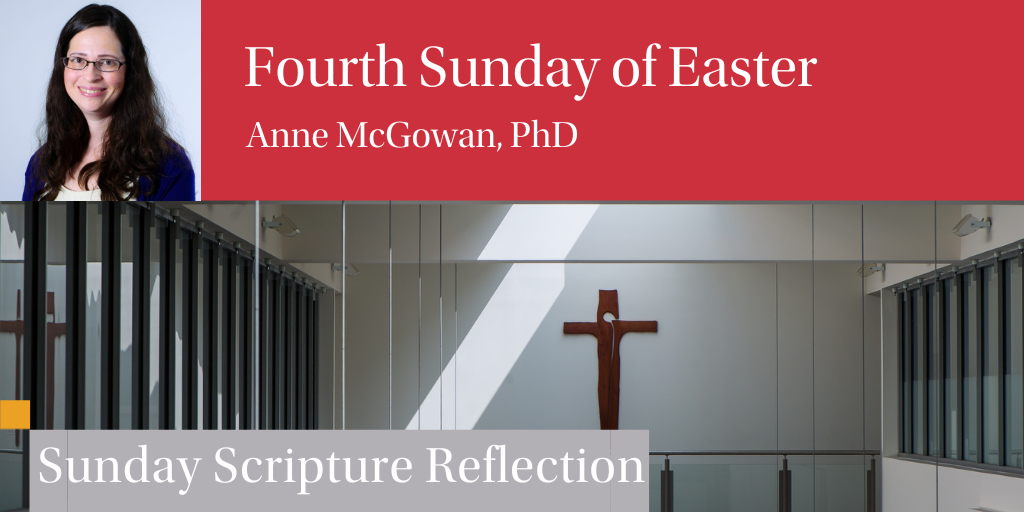

Readings:
Reading I: Acts 13:14, 43-52
Psalm 100:1-2, 3, 5
Reading II: Revelation 7:9, 14b-17
Gospel: John 10:27-30
As an undergraduate animal science major, my first experience with a whole flock of sheep was a profound disappointment. Rather than friendly followers like Mary’s little lamb, this assembly of sheep was skittish and scattered. They heard my voice but did not know it, and they promptly fled as far as possible, forming a nervous clump in their pen.
Sheep have a strong herd instinct, rooted in their evolution as animals preyed upon by others. Since they find safety in numbers, they benefit when they blend in with the other members of the flock and avoid appearing or acting in ways that might make them stand out as individual animals with distinctive characteristics. When a sheep stays with the herd, it can graze in relative safety because it will notice when another sheep alerts the rest to potential danger. But a sheep that wanders off by itself is bound to find trouble. A shepherd, however, can keep watch for the straying sheep that the rest of the flock might sacrifice to preserve the safety of the majority. Sheep will listen to and follow a shepherd who has dwelled with them, tended them, and reassured them. Such a shepherd keeps sheep from perishing. The shepherd knows the sheep, and the sheep will follow when they hear the shepherd’s voice.
People in ministry roles often are formed to identify with shepherds, but all of God’s people are God’s sheep first – the flock that God tends. God the Shepherd so loved the sheep that the Son of God became the Lamb of God who takes away the sins of the world, has mercy on us, and receives our prayer. The paradox of the paschal mystery that we celebrate with particular intensity during this Easter season is that Jesus the Good Shepherd becomes the saving sheep who strengthens and nourishes the flock. The Lamb who was slain but now is alive forever and ever again becomes the enthroned shepherd who protects and leads, who comforts and feeds, who grants us peace. Blessed indeed are those called to the supper of the Lamb! Those who follow Jesus and feast on Jesus are promised nothing less than eternal life. “Look upon your flock, kind Shepherd, and be pleased to settle in eternal pastures the sheep you have redeemed by the Precious Blood of your Son” (Prayer after Communion for the Fourth Sunday of Easter).
As God’s sheep still sojourning this earth find their sustenance not yet in eternal pastures but meanwhile in the mountain heights and dark valleys and city streets where Jesus leads them now, they still need their Good Shepherd. What disciples do draws attention. Filled with joy and the Holy Spirit, they are often called to step out from the herd, to speak an unpopular word, to serve in ways that prioritize self-giving over self-preservation, to make themselves vulnerable for the sake of the Gospel. Even other sheep who belong to God’s flock but who still need God’s mercy, like all of us do, might not come to their assistance in their times of greatest need. But no one can take a single one of them from Jesus’ hand. They shall never perish when Jesus is with them although they might be drawn out from places of safety they are inclined to seek. Pope Francis claimed in Evangelii Gaudium, “I prefer a Church which is bruised, hurting and dirty because it has been out on the streets, rather than a Church which is unhealthy from being confined and from clinging to its own security” (no. 49).
Pope Francis has also called pastors and evangelizers to embrace the “smell of the sheep” that comes from prolonged close contact such that the sheep will hear the voice of Jesus through them. Disciple-sheep can mix freely with any other sheep they encounter without fear of being “lost.” As long as they remember the Good Shepherd’s voice, the shepherd can call them out from wherever they are and lead them to the next place they should go. In a world filled with shouting would-be shepherds, is the enduringly kind and faithful voice of Jesus the one we hear loudest and clearest, the voice we know best because he knows us best? Do we dare to be delightfully distinctive disciples who trust that voice to lead us through temporary difficulties, deprivations, and dangers to the unending joy of eternal life?
Assistant Professor of Liturgy